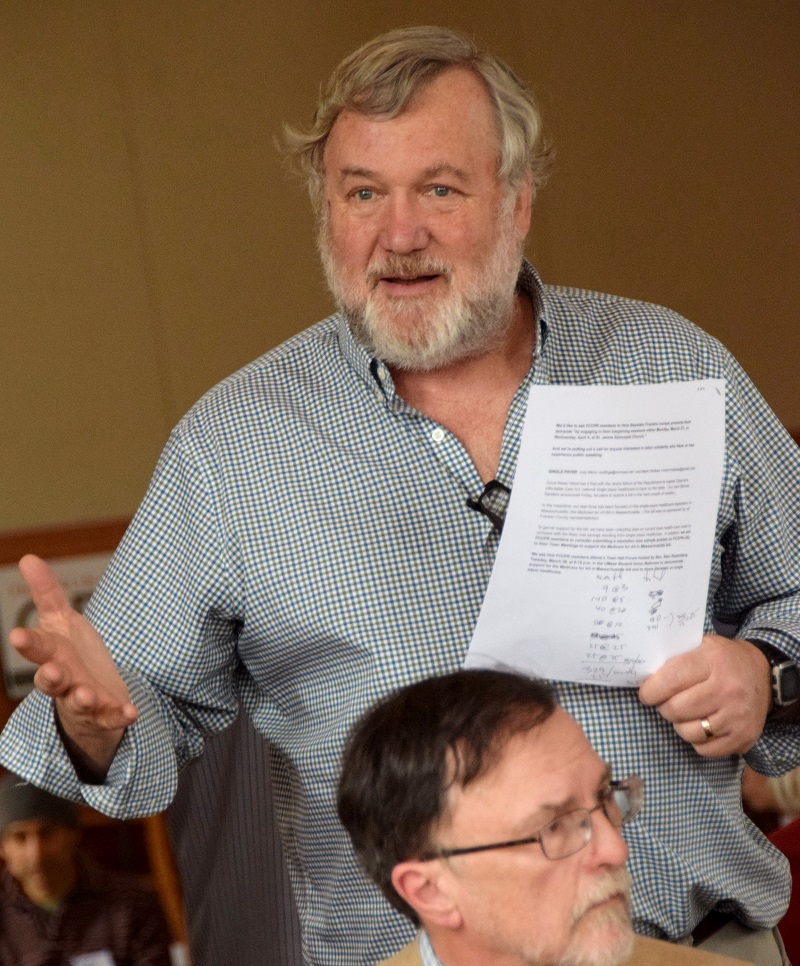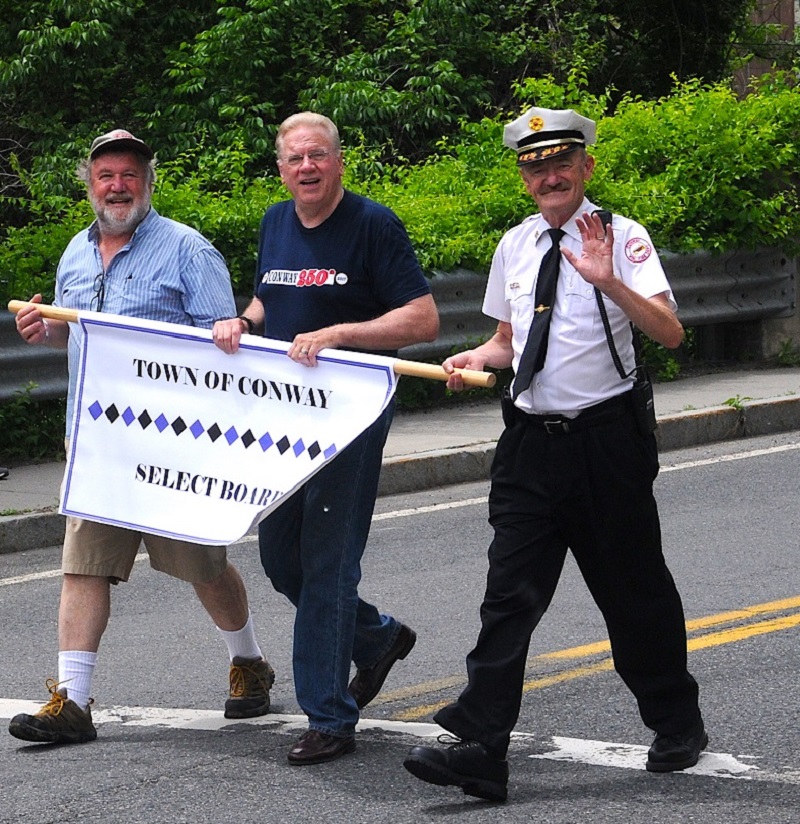The Sierra Club is widely acknowledged as the most influential grassroots-driven environmental organization in the country—and rightfully so, given its size and scope. At the same time the creative use of outside-the-box thinking has its benefits, and the Club’s Massachusetts Chapter has initiated a novel program that uses this approach to great effect.
For the last two years the chapter used old-school outreach to identify and engage municipal officials from across the state who embrace the idea of 100% renewable energy, and who are willing to adopt local policies to support that goal. With this foundation in place, a series of five regional climate leadership summits was held over the past year, and on March 16 a culminating statewide summit took place at Framingham State University.
Statewide summit attendees in Framingham engage with each other. Photo courtesy of the Sierra Club.
Sierra Club staffer Jacob Stern is the clean energy organizer for the program, which is an in-house effort with no national campaign coordination. “We’re just starting to see dividends now; it takes time to build trust with officials,” he says. “I’ve recruited about 95 percent of the people who show up by emailing and making phone calls to describe how the program can help them, and how what we want to achieve is mutually beneficial.”
The regional summits averaged around 20 elected or appointed policy-makers with such titles as select board member, city councilor, or town administrator. “Climate leader summits are educational; we’re connecting them with resources that might make it easier for folks to say ‘Hey, this is the obvious next step,’” says Stern.
The regional events aim to accomplish this by providing an overview of topics such as short-term projects, applicable laws, and funding pools. (“That always gets great reviews,” Stern says of the latter. “People love finding out they can get money!”) There’s also the opportunity to network with other officials, sharing knowledge and ideas that help solve problems they encounter on their home turf.
The state summit—attended by over 50 officials, including some previous regional participants—featured high-level keynote speakers such as State Senate President Karen Spilka, as well as breakout sessions for deeper dives into four clean energy topics: electrifying transportation, community choice energy, building codes, and energy efficiency efforts. “They gave us three hours of their Saturday; it was a very exciting, powerful afternoon,” says Stern.
State Senate President Karen Spilka speaks at the Framingham summit. Photo courtesy of the Sierra Club.
The climate leadership program was funded in 2017 with an initial grant from the Boston-based Barr Foundation. The organization recently awarded a second two-year grant, ensuring the program will have the opportunity to grow and deepen its focus. “Our next steps are to figure out what Phase II looks like,” says Stern. “We plan to hold at least two more regional summits in parts of the state that didn’t have them earlier. We’re also considering working groups where officials meet to talk about specific policies, and how they can push for them, by pooling their efforts with other jurisdictions and becoming better clean energy advocates to Governor Baker.”
A monthly newsletter for program members reports on upcoming events, recent victories, and clean energy news. “If you’re doing something cool, let us know and we’ll blast it around the state so everyone knows about it,” Stern says. “It makes our participants more competitive—everyone wants to have the best results.”
One such official working to score wins for his constituents is Bob Armstrong, who in 2016 was elected to the three-member board of selectmen in the western Massachusetts town of Conway, in Franklin County. Born in Northern California to parents who met in the US Navy during World War II, Armstrong spent his formative years in Philadelphia then moved to Cambridge, Massachusetts to attend MIT.
Upon graduating in 1970 he started working for Digital Equipment Corporation just as the computer industry was taking off. Ten years in he began raising sheep, which instilled the desire to live in a more pastoral atmosphere. "I wanted to move to a place with lots of nature and farming,” he says. Conway fit the bill, and Armstrong was able to continue his bill-paying job remotely while tending to his sheep in the countryside. He also married and had four children—or as he puts it, “I grew a flock of sheep and eventually a flock of kids.”

Notes in hand, Selectman Armstrong weighs in. Photo courtesy of Bob Armstrong.
An active member of the Appalachian Mountain Club, Armstrong some years ago realized a growing concern. “I have a strong penchant towards enjoying the outdoors, and I want my kids to have a world where that exists. As climate change became more difficult to ignore, it felt to me like there’s nothing we need to worry about more than that.”
Armstrong was already active with the clean energy coalition Mass Power Forward when he was invited to participate in the Sierra Club’s climate leader program based on his selectman position; he also knew Club organizer Stern through the coalition. He attended the Club’s regional summit in Pittsfield, as well as the statewide summit in Framingham. “He was an active and engaged participant at both events,” says Stern.
Armstrong drove his electric vehicle, a Chevy Bolt, a hundred miles to the state summit and was chagrined to discover the host campus lacked a charging station. “I gave Jacob a hard time for that one,” he says.
Armstrong is actively involved with multiple organizations addressing climate change. “There are hundreds of groups that plan wonderful events; some do so jointly, and the Sierra Club is one of them,” he says. “I could attend a conference on the topic somewhere in Massachusetts every weekend.
“I try to bring info about what’s going on to people at home; for example I really liked the Club’s slide presentation at the state summit, and shared it afterwards with our Franklin County Continuing the Political Revolution task force as a summary of the things that need to be worked on.”

Armstrong, left, walks with fellow select board members in Conway's 250th anniversary parade . Photo courtesy of Bob Armstrong.
The sheep have been gone for 15 years, and Armstrong retired from his tech job a few years ago, too. “It’s nice to have time to dedicate to things I care about, especially climate change and elective politics,” he says. (Of Republican governor Charlie Baker, Armstrong says, “He’s never met a fracked gas pipeline he didn’t like.”) Armstrong’s own selectman seat is up for reelection this year as well.
Stern calls Armstrong a “super climate champ,” a designation that Armstrong accepts, well, sheepishly. “That’s an honor, but I view Jacob and others as the true climate champs,” he says. “I’m happy to be a sergeant in their army.”
"Sergeant" Armstrong, left, and friends in the war against dirty energy with a new solar tracker. Photo courtesy of Bob Armstrong.
